DVD/Blu-ray: Ludwig
Visconti and Helmut Berger give beauty depth in the tragedy of the Bavarian king
No-one has ever matched costume drama to psychological depth quite like Luchino Visconti.
No-one has ever matched costume drama to psychological depth quite like Luchino Visconti.
Birdcage Walk in Bristol really exists. It runs under an arched canopy of branches though a long-disused graveyard in Clifton. At this eerie spot, all that remains of the blitzed church of St Andrew’s, rosebay willowherb grows waist-high but “no one lays flowers here; no one mourns”.
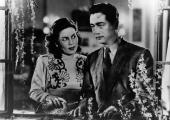
There’s rich irony in the timelining of 1940s Chinese blockbuster The Spring River Flows East.

Daniel Levitin makes one reference to Donald Trump in this book (to the latter’s claim to have seen on TV “thousands and thousands” of Muslims in Jersey City cheering when the Twin Towers fell) but he couldn’t have known quite how apposite these words would be on publication: “In the current information age, pseudo-facts masquerade as facts, misinformation can be indistinguishable from true information.”

The Guardian called Brexit “a rejection of globalisation.” That’s as may be, but the reality is we cannot, however much we might want to, check out of the globalised world in which we live. Globalisation has defined the 20th and 21st century and while the future is uncertain, one thing we can sure about is that it will continue to become ever more inter-connected.

North London’s much loved Estorick Collection is reopening its doors after a five-month spruce up. The Georgian listed building that houses a 120-piece collection of modern Italian art now boasts a new glass conservatory, opened out entrance hall and "daylight-enhanced" gallery spaces. It all bodes well, even if the reliance on a period of prolonged British sunshine to complete the effect feels a touch optimistic right now. Here’s hoping.
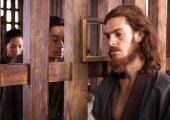
Audiences cannot fail to register the enormity of Martin Scorsese’s achievement in Silence. At 160 minutes, it hangs heavy over the film: adapted from the 1966 novel by Japanese writer Shusaku Endo, Silence has been close on three decades in the director’s preparation. It raises questions that are usually approached with Capital Letters. There are moments that are visually enthralling, landscapes of nature that dwarf the sufferings – visceral, in the literal sense, since they involve damage to the human body – inflicted on many of its characters. We’ll leave the “and yets” to later…
The opening scene is paradigmatic: a wide landscape of torture, crucifixes placed by steaming pools which provide boiling water to agonise both the Christian believers of Japan and the western missionaries who came to convert them. It is 1633, and the Japanese authorities, perceiving Christianity as a threatening adjunct of colonialism, force their captives to deny their religion – to commit apostasy, the issue and the act which sears the very gut of Scorsese’s film.
You may be reminded of Christoph Waltz, or alternatively of Ken Dodd’s false teeth gags
Its usual form involved trampling on the fumi-e, an image of Christ or Mary; when proof of more extreme rejection was demanded, it involved spitting on the cross. Such were the dilemmas confronting Japan's hidden Christians, the Kakure Kirishitan, who attempted to worship in secret. But this opening scene forces a more extreme choice on the missionaries – to embrace their extreme suffering, in the manner of Christ, or to make an exemplary repudiation of belief. Under such circumstances, that denial can never be treated – let alone interpreted – as following God’s will. Or can it?
The Jesuit priest at the centre of Silence is Father Ferreira (Liam Neeson, pictured below), although we encounter him only in its last scenes. When reports of Ferreira denying his faith eventually reach his order back in Lisbon, two of his incredulous disciples – Fathers Rodrigues (Andrew Garfield) and Francisco Garrupe (Adam Driver) – volunteer to travel to Japan to prove his innocence. They seem far from heroic figures, although they undertake such a journey at obvious risk to their own lives.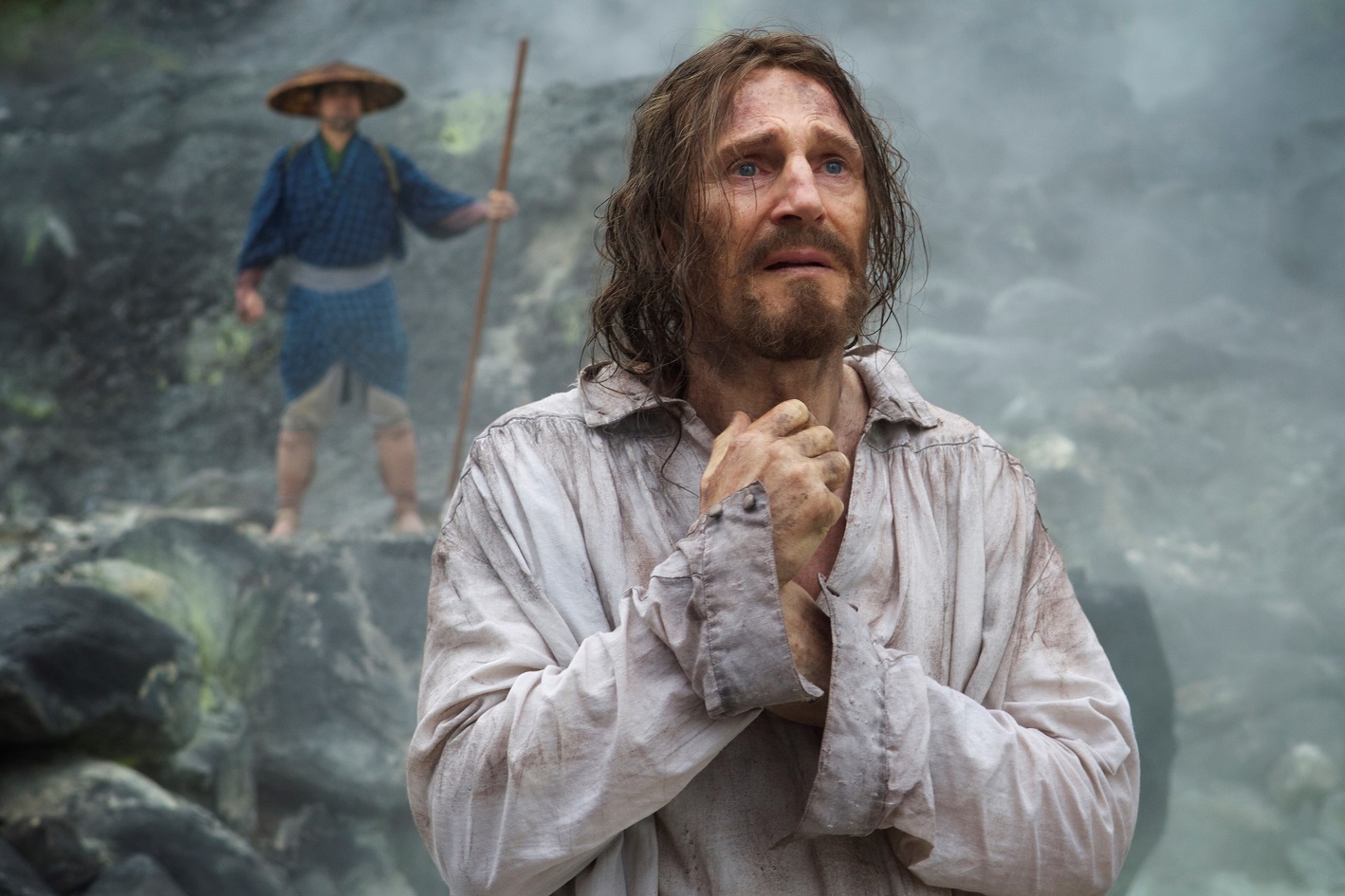 Their quest may have earned comparison to Conrad’s Heart of Darkness, and along with that Coppola’s Apocalypse Now, but it’s a pale equation. Neeson’s Ferreira has wrought not physical horror, rather – if anything – a cerebral one (while the charge that Silence aims for the brain, rather than the heart, is a real one). The two priests’ journey to the shores of Japan is easy enough; in Macau they acquire a guide, the eccentric Kichijiro (Yosuke Kubozuka), whose lapses go beyond religion, and for whom denial and seeking forgiveness follow a practically cyclical basis, to occasionally comic effect.
Their quest may have earned comparison to Conrad’s Heart of Darkness, and along with that Coppola’s Apocalypse Now, but it’s a pale equation. Neeson’s Ferreira has wrought not physical horror, rather – if anything – a cerebral one (while the charge that Silence aims for the brain, rather than the heart, is a real one). The two priests’ journey to the shores of Japan is easy enough; in Macau they acquire a guide, the eccentric Kichijiro (Yosuke Kubozuka), whose lapses go beyond religion, and for whom denial and seeking forgiveness follow a practically cyclical basis, to occasionally comic effect.
But the priests’ first encounters with the hidden believers of Japan (Taiwan provided most locations for the film) are deadly serious, not least because of the mortal threat of discovery. The celebration of sacrament (pictured below) in secret has the urgency of the early Roman catacomb believers, and is received with a joy that seems greater than in more secure environments (though whether that is actually the case is another question, raised later). Their ministry continues, but the two priests can only escape capture for so long, at which point Scorsese narrows the perspective of his film to concentrate on Garfield’s character. There’s a change of register, too. Rodrigues faces expert opponents, in the figure of the local inquisitor Inoue (Issey Ogata) particularly, as well as the latter's interpreter (Tadanobu Asano). It's a sometimes unsettling balance: Ogata is something of a Japanese thespian legend – he played Emperor Hirohito in Alexander Sokurov's The Sun, too– who’s as much famed as a comedian, and he manages occasionally disarming comic effects here. (You may be reminded either of Christoph Waltz, or alternatively of Ken Dodd’s false teeth gags.)
There’s a change of register, too. Rodrigues faces expert opponents, in the figure of the local inquisitor Inoue (Issey Ogata) particularly, as well as the latter's interpreter (Tadanobu Asano). It's a sometimes unsettling balance: Ogata is something of a Japanese thespian legend – he played Emperor Hirohito in Alexander Sokurov's The Sun, too– who’s as much famed as a comedian, and he manages occasionally disarming comic effects here. (You may be reminded either of Christoph Waltz, or alternatively of Ken Dodd’s false teeth gags.)
Inoue’s tactics are deadly, however. He forces his captive to witness cruelty wrought on others – burning and blood-draining are mild when set against crucifixion-drowning – all the time reminding Rodrigues that he only has to perform a single gesture to stop such torture. Intellectually too, he articulates the view later espoused by Ferreira himself when the two priests eventually meet, that the Japanese believers had never followed true Christianity, rather a mixed-up belief system that overlapped with their pantheism; and that Japan is a "swamp" where Christianity “does not take root”. To all of Garfield’s prayers, his God remains silent.
That final meeting with Ferreira is anticlimactic – worse, it lacks the intensity of communication that might provide dramatic conviction. The older westerner now lives with a Japanese wife, as in due course will Rodrigues (echoes of Scorsese’s The Last Temptation of Christ). What we witness of their closing years is treated with a rapidity that at this stage comes as considerable relief. These are actors expiring with a whimper, and not making us believe in the significance of that last gasp, although how you interpret the film’s final scene will certainly affect your final judgment of it (as, inescapably, will your own religious convictions, or lack thereof).
Scorsese regulars Dante Ferretti and Rodrigo Prieto make stand-out contributions in production design and cinematography respectively, as was to be expected. Three years after the drastically different The Wolf of Wall Street – that contrast is so huge – it’s hard to say just what we might have expected from Silence. We can’t judge the director for the range of his intentions, however, but rather on the integrality of his execution. On that basis Scorsese’s new film falls short: being ponderous does not equate with achieving gravity.
MARTIN SCORSESE ON THEARTSDESK
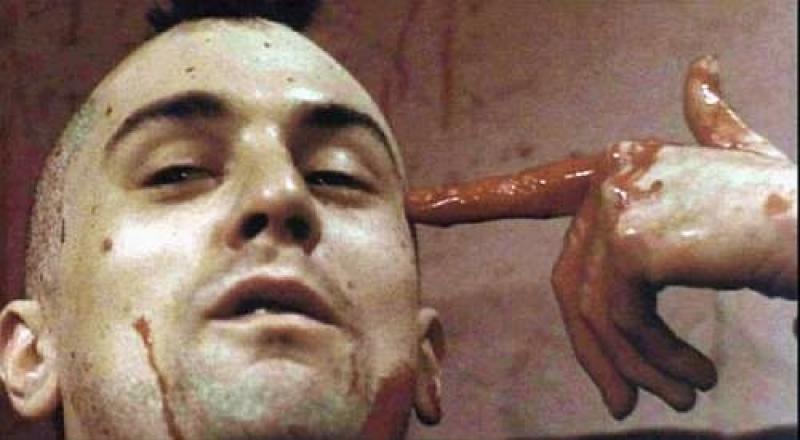 Taxi Driver (1976). Talking to me? Scorsese's classic starring Robert De Niro (pictured) is restored and re-released on its 35th anniversary
Taxi Driver (1976). Talking to me? Scorsese's classic starring Robert De Niro (pictured) is restored and re-released on its 35th anniversary
Shutter Island (2010). Not a blinder: Leonardo DiCaprio in Martin Scorsese's feverish paranoid thriller
Hugo (2011). Scorsese does a Spielberg in sumptuous look at the origins of cinema
George Harrison - Living in the Material World (2011). Martin Scorsese's epic documentary of the Quiet One
The Wolf of Wall Street (2014). Con brio: Scorsese and DiCaprio tell of the rise and fall of a broker
Arena: The 50 Year Argument (2014). A warmly engaging film about the 'New York Review of Books' might have been more than a birthday love-in
Vinyl (2016). Scorsese and Jagger's series is prone to warping, skipping and scratches
Silence (2016). Scorsese's latest is a mammoth, more ponderous than profound
Overleaf: watch the trailer for Silence

Just 22 years old, South Africa’s national “Day of Reconciliation” on 16 December has shuffled into its perplexed young adulthood. Although commemorative events abound, few people seem to know how to strike the right note for this (just) pre-Christmas holiday. It symbolically occupies a date dear both to Afrikaners - victory over the Zulu kingdom at the Battle of Blood River in 1838 - and to their erstwhile victims.

Ebullient, prolific, loquacious and a charmingly enthusiastic historian both in print and for television, Simon Sebag Montefiore has turned his attention to the pivotal city of Vienna, nourished equally by the Danube and its central geographical position in Europe.
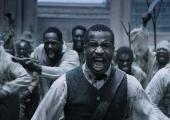
DW Griffiths's 1915 silent epic, The Birth of a Nation, became notorious for its pejorative portrayal of black people and its heroic vision of the Ku Klux Klan. For his directorial debut, Nate Parker has appropriated Griffiths's title and whipped it into a molten onslaught against America's history of slavery and racial prejudice.
Arriving in an America outraged – yet again – by police violence and witnessing the rise of Black Lives Matter, Parker's The Birth of a Nation was uncannily timely, and it prompted a studio bidding war when it premiered at Sundance in January this year. It's a dramatisation of the real-life slave rebellion led by Nat Turner in Southampton County, Virginia in 1831, depicting Turner as a visionary preacher pre-ordained to lead his people from their bondage, though his bloody attempt to do so was doomed to failure.
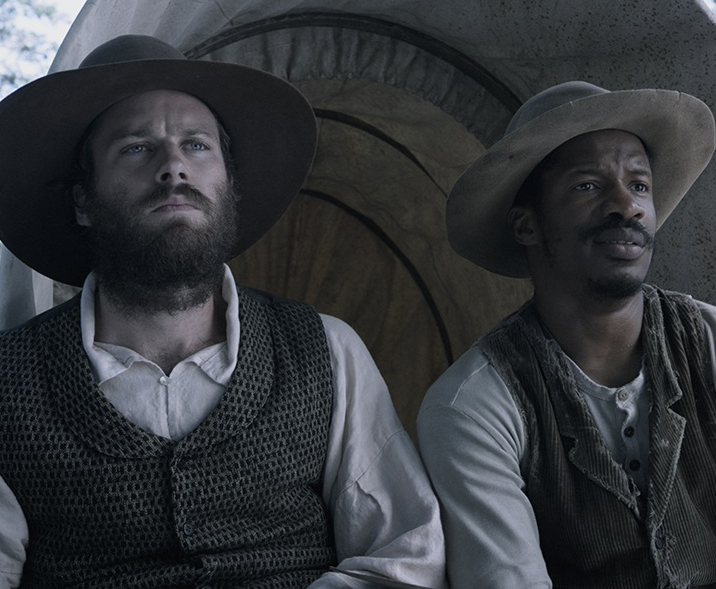 Parker directed, stars and wrote the screenplay (the story is credited to Parker and Jean McGianni Celestin), and he has brought a charismatic energy to the project which often overrides the orthodox nature of the storytelling. As a boy, the young Turner is taught to read by plantation mistress Elizabeth Turner (Penelope Ann Miller), a kindly act somewhat undercut by Elizabeth's view of her slaves as a species positioned somewhere between infanthood and the animal kingdom. "These books are for white folks," she explains patiently. "They're full of things your kind wouldn't understand."
Parker directed, stars and wrote the screenplay (the story is credited to Parker and Jean McGianni Celestin), and he has brought a charismatic energy to the project which often overrides the orthodox nature of the storytelling. As a boy, the young Turner is taught to read by plantation mistress Elizabeth Turner (Penelope Ann Miller), a kindly act somewhat undercut by Elizabeth's view of her slaves as a species positioned somewhere between infanthood and the animal kingdom. "These books are for white folks," she explains patiently. "They're full of things your kind wouldn't understand."
Nonetheless, the lad studies the Bible, finds he has a gift for sermonising, and begins preaching the Word to his fellow slaves. Times are hard in the South, and at the urging of the Reverend Zalthall (Mark Boone Junior), Nat's owner Sam Turner (Armie Hammer, pictured above with Parker) hires Nat out to local plantations, with the aim of placating rebellious urges among the slaves with soothing Scriptural messages.
Sam Turner seems relatively liberal, enjoying a friendly rapport with Nate (they were childhood friends) and rescuing him from the vengeful intentions of a spiteful fellow landowner. However, in Hammer's skilful portrayal, he's gradually revealed as a weak man with a drink problem who's never going to break ranks with his white compatriots and become a civil rights advocate for his negro chattels.
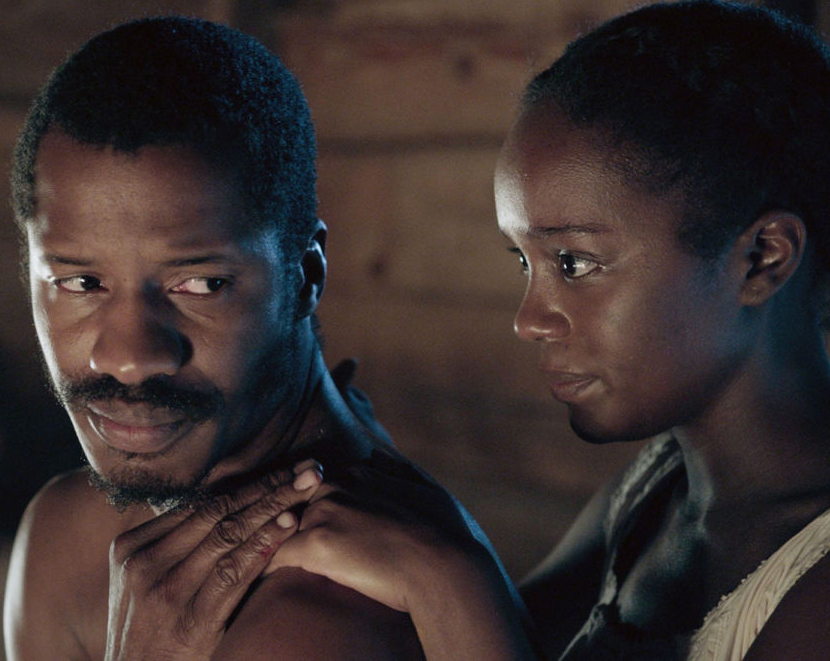 The narrative steadily gathers pace as it arcs towards its inevitable denouement. Nat's early optimism is soured by the appalling sights he sees on his travels (not least a scene where a slave has his teeth knocked out with a chisel before being force-fed). His preaching begins to sound more like a cleverly coded exhortation to fling off the chains of bondage and rise up, and his progress towards rebellion is guided by visionary images (corn spattered with blood, a dramatic total eclipse). A couple of incidents of rape, including an assault by slave-catchers on his wife Cherry (Aja Naomi King, pictured above, depicted as little more than a signifier of idealised love and fidelity), prompt Nat to recall that the Lord could be vengeful as well as merciful. When he's brutally flogged by Sam, for baptising a white man, the rebellious die is cast.
The narrative steadily gathers pace as it arcs towards its inevitable denouement. Nat's early optimism is soured by the appalling sights he sees on his travels (not least a scene where a slave has his teeth knocked out with a chisel before being force-fed). His preaching begins to sound more like a cleverly coded exhortation to fling off the chains of bondage and rise up, and his progress towards rebellion is guided by visionary images (corn spattered with blood, a dramatic total eclipse). A couple of incidents of rape, including an assault by slave-catchers on his wife Cherry (Aja Naomi King, pictured above, depicted as little more than a signifier of idealised love and fidelity), prompt Nat to recall that the Lord could be vengeful as well as merciful. When he's brutally flogged by Sam, for baptising a white man, the rebellious die is cast.
Parker has been accused of excessive self-regard for the Christ-like overtones in his portrayal of Turner, while any positive contribution towards bridging the racial divide has been scuppered by his depiction of the white characters almost exclusively as depraved, misshapen sadists. The Birth of a Nation's apparently glittering commercial prospects in the States were dented by a media storm over the fact that both Parker and Celestin had faced rape allegations in 1999. Nevetheless, if we can judge the art and not the artist, this is vivid and unsettling film-making.
Overleaf: watch the trailer for The Birth of a Nation